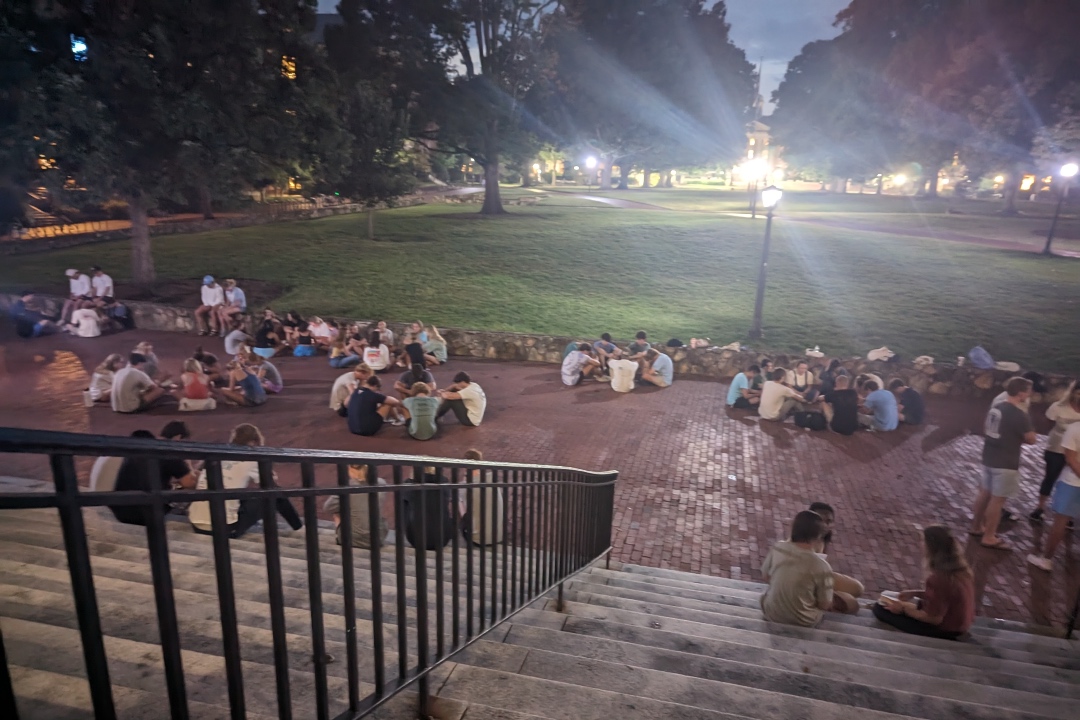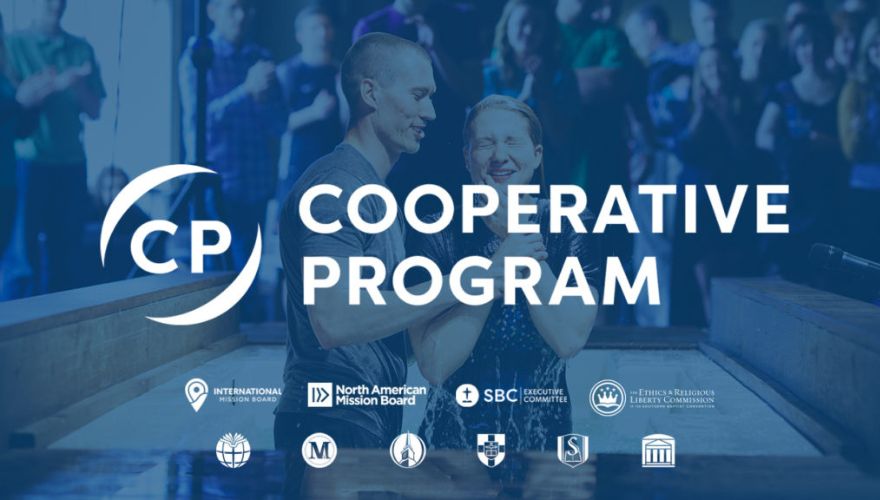
WAYNESVILLE, N.C. (BP) — Surely that was rehearsed, Woodland Baptist Church deacons teased pastor Adam Black at the May 5 deacons’ meeting.
Woodland Baptist in Waynesville was on official notice from the Baptist State Convention of North Carolina that unless it gave to the Cooperative Program (CP) this year, it would no longer be considered a cooperating Southern Baptist church.
How could that be? Wasn’t the church missionally focused, both in word and deed? Just as Black began to answer the deacons’ questions – having researched the point himself to quell his own surprise – in walks none other than Todd Unzicker, NC Baptist executive director-treasurer.
“All the deacons started laughing, like you planned this,” Black said. “It was the craziest thing ever.”
But Unzicker, dropping by to speak while on his way to preach at a local church, was able to answer the deacons’ question on the spot.
Woodland gives consistently, Black told Baptist Press, to the Lottie Moon Christmas Offering, the Annie Armstrong Easter Offering and the Haywood Baptist Association. It supported as many as three missionaries in the field and contributed to local ministries it embraced as partners, such as a local pregnancy center. But none of those contributions, which perhaps qualify as Great Commission giving, were made directly to the state through the Cooperative Program.
“To us it’s zero,” Unzicker told Baptist Press regarding donations any church gives directly to any Southern Baptist concern other than the state convention. “Because we’re not hearing from the church. … We have no way of knowing. If they send it directly to Nashville (to the Southern Baptist Convention Executive Committee) we don’t have a record of that.”
In North Carolina, churches must give to the CP through the state convention at least once every three years to be considered in friendly cooperation. Messengers to the state’s 2022 annual meeting amended Article VI of the convention’s Articles of Incorporation to stipulate what constitutes a church in friendly cooperation.
Beginning in 2022, churches must give at least once to the CP between 2022 and 2024 to remain in friendly cooperation with the state convention. Annually, the state must notify churches that didn’t give the previous year.
“For North Carolina Baptists, on mission together is more than a slogan. It’s who we are,” Unzicker said. “The changes we’re making we believe are more streamlined in allowing more participating churches to be on mission together.”
Black supports the changes.
“I’m all about it,” Black said. “I kind of equate it to church membership, in a sense. If you don’t clearly define what a member is, you don’t really have a membership. To me, it’s the same … with North Carolina Baptists or an association. If you’re going to say you’re a member, then you need to be engaged in the mission. And that goes into being involved at every level.”
Black, who began pastoring Woodland in June 2023, has already informed the church treasurer of the necessary changes, he said.
Woodland is one of 1,302 NC Baptist churches that didn’t give to the CP in the two consecutive years of 2022 and 2023, according to numbers from Seth Brown, NC Baptists’ convention relations director. The non-giving churches represent 29 percent of the current 4,348 congregations on the roll.
All received letters notifying them of their non-giving status. The number is a decrease from the 1,722 churches that didn’t give through CP in 2022. Already in the first four months of 2024, Brown said, 23 churches that were in danger of losing cooperation status have given through CP.
James Allen Murray, NC Baptist first vice president, chaired the 2022 committee that studied church cooperation and recommended changes.
The changes are intended to foster cooperation while also being honest about who is actually cooperating, said Murray, senior pastor of Centerville Baptist Church in Kelly.
“Kind of like a lot of churches have moved to trying to be very honest with their membership roll,” Murray said. “If you’ve got 2,000 people on your membership roll of your church and you have 300 people there on Sunday, you might have 2,000 people on your roll but you don’t have 2,000 active members of your church.”
Murray acknowledges the change could decrease the size of the convention, but is optimistic churches will be more involved in state convention ministries and work.
“We certainly understand and recognize that soon after three years of these changes in our Articles of Incorporation that we’re going to lose a lot of churches as far as numbers go,” Murray said. “But it’s not that we want to see the numbers dwindle, or we want the convention to shrink. It’s not that we want to see these churches be removed. We understand that those numbers would drop.”
The committee also recommended clarifications in other requirements of cooperation, including how churches respond to LGBTQ-related issues, racism and sexual abuse.
The changes related to financial giving allow grace for churches that want to give but are experiencing financial hardship. In such individual cases, the convention will work with churches to navigate and resolve their challenges. Already, no minimum amount is required.
North Carolina is having great success encouraging cooperation through CP giving and engagement in all areas of state convention church life, Unzicker said, as many really want to be active in NC Baptists’ work.
“We’ve had multiple this week alone call and say we want to be a participating NC Baptist church. We’re very confident,” Unzicker said. “NC Baptist attendance is up at our annual meetings. NC Baptist giving is up. NC Baptist church-planting numbers are up. IMB (International Mission Board) will tell you that five of the top sending churches in the nation come from North Carolina. We are a sending state and we are on mission together.”
North Carolina Baptists reportedly gave $29.3 million through CP in 2023, the highest since 2017. That’s up from $28,153,376 the previous year. The convention’s churches also gave record amounts of $15 million to the Lottie Moon Christmas Offering and more than $7 million to the Annie Armstrong Easter Offering.
In 2024, NC Baptists will forward 50 percent of CP funds to the Southern Baptist Convention Executive Committee to support national and global Southern Baptist work, retaining 50 percent in the state. State messengers to the 2023 annual meeting approved the allocation.
Churches deemed not in friendly cooperation at the end of 2024, while losing membership privileges, will not be summarily dismissed, Unzicker said.
“We are using the language that if they have not participated with us, they will not be NC Baptist participating churches,” Unzicker said. “We will still continue to engage with them, invite them to be on mission together with us, and have the door wide open to reach the unreached, send planters and missionaries, train up the next generation and serve their communities.”
North Carolina’s Great Commission catalysts are active in the convention’s 10 regions, Unzicker said, working in the field to encourage and mobilize participating churches.
Black, a longtime Southern Baptist, encourages churches to support the CP.
“I would say recognize what constitutes cooperation,” he said. “We obviously believe cooperation is important, and so, give to the Cooperative Program.”
(EDITOR’S NOTE — Diana Chandler is Baptist Press’ senior writer.)


